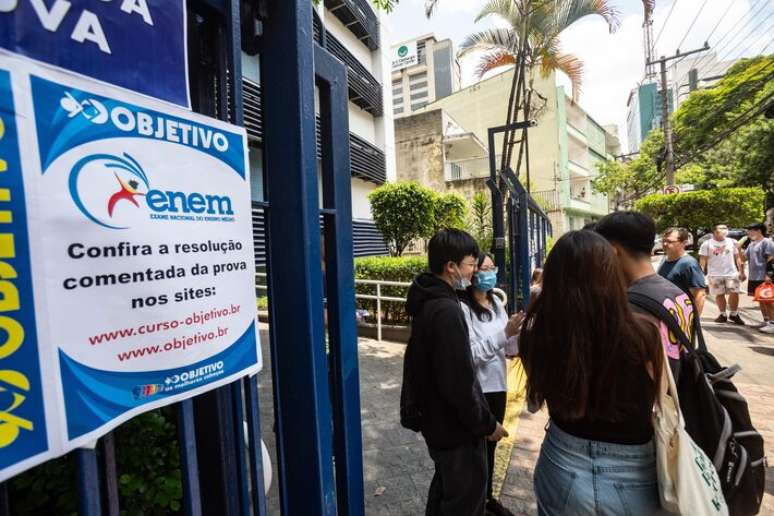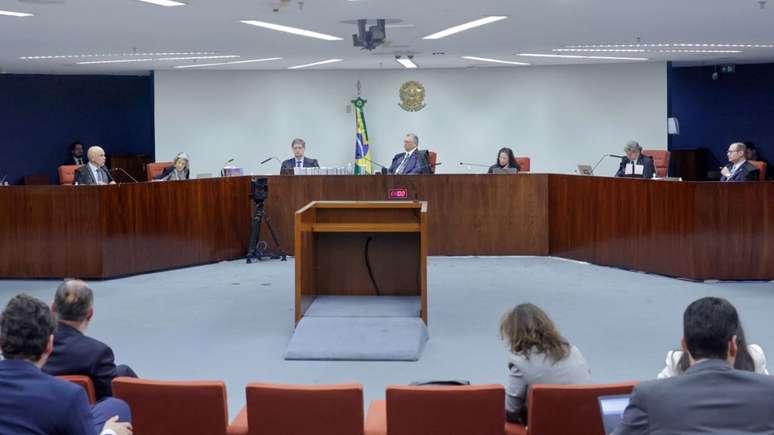The methodology of the Brazilian exam has not yet been updated, educators warn. The Ministry of Education is looking for the reasons for the decline in the number of ENEM participants.
Among the many aspects of educational reality influenced by the emergence of new technologies, such as artificial intelligence, there are the evaluation systems to which educational institutions are subjected.
According to Maria Helena Guimarães de Castro, holder of the Ayrton Senna Chair for Innovation in Educational Evaluation at USP of Ribeirão Pretomethodologies such as the Basic Education Assessment System (Saeb) are still anchored to obsolete standards, created in 2001.
“Inep (National Institute for Studies and Research) has already revised the matrix, but has not yet applied it to the Mathematics and Portuguese Language tests. The one we have is still insufficient compared to international evaluation standards.”
For her, Brazil has a serious evaluation system, but it needs improvements on a methodological level, with digital tests, adaptive platforms and the use of artificial intelligence. “If we look at Pisa (International Student Assessment Program), they apply exams that have numerous advances compared to Saeb, with much more advanced matrices and methodologies, with open questions and constructed answers, based on 21st century skills that Saeb does not evaluate. “
Maria Helena underlines that evaluation processes serve to improve teacher training programs and how schools can improve their pedagogical proposal, and not for the personal evaluation of students.
“These systems must incorporate assessment of skills and competences that is compatible with what is practiced in other countries’ methodologies. Schools are inspired and supported by national assessments. If it remains as it is, schools will not be encouraged to change.”
According to her, in Brazil artificial intelligence tools are not yet widely used in educational assessment, but this is already a global trend to accelerate test correction. “Behind there are humans who program the AI. It is possible to increase the number of tests at lower costs. Not only multiple choices, but also constructed responses. With AI it costs much less. Pisa does this. AI does not will solve the problem” problem, but to help experts prepare and correct the tests.”
According to Maria Helena, a key aspect of the future of assessments is to detect social-emotional skills and competences, which are essential in the comprehensive training of students and educators. “The well-being and socio-emotional development of children and young people constitutes the great challenge that education faces in today’s world, marked by uncertainty and growing radicalisation.”
According to Sérgio Leite, retired professor and former director of the Faculty of Education Sciences Unicamp Between 2008 and 2012, the risk we are facing today is that of maintaining an educational evaluation system that mainly concerns a sort of student ranking.
“This is, without a doubt, the most backward format.” For him, evaluation is positive and necessary, as long as it is seen as a process of reorganizing progress and carrying out diagnoses that allow investment to overcome difficulties. “I have many doubts that what is being done today takes this perspective into account.”
As regards the use of artificial intelligence tools in traditional evaluation processes, he believes that it can represent a valid alternative, as long as it is carried out with criteria. “It depends on how these technologies are applied. They can be used, but as a support. Those who really have to make the decisions are the educators.”
The government wants to understand the decline in participation in Enem
The issue of assessment and exam submission is also a focus of concern for the Ministry of Education (MEC). In recent years, the number of students taking Enem has decreased in the country. Last year, less than half of the young people enrolled in their final year of high school took the exam.
Visiting the Estadao Earlier this month, Education Minister Camilo Santana said the government was conducting research to understand the reasons. “There is a lack of local leadership to provide motivation, there is a lack of encouragement from networks with students.”
Regarding the changes in the Enem due to the reformulation of the new secondary education, approved last month in the Chamber of Deputies, Camilo said that the test should not evaluate the flexible part of the curriculum. “Enem must focus exclusively on general basic training.”
In a hearing in the Senate, the director of Basic Education Evaluation at INEP, Rubens Lacerda, stated that “in practice, the training path will have to adapt to ENEM”. According to him, it is more appropriate for the schools themselves, the municipal and state networks to carry out training evaluations in relation to this optional part which will remain for the future. “This provides the flexibility that is the purpose of all high school debate.”
Pisa evaluates the way students approach problems
The Program for International Student Assessment, an acronym in English for what became known simply as Pisa, has in recent years become the largest student exam in the world. It has been carried out every three years since 2000 and evaluates adolescents aged 15, regardless of the school grade they are in in their countries. It was carried out in 2018, with results known at the end of 2019.
Due to the pandemic, Pisa 2021 could not be applied and ended up turning into Pisa 2022, due out in 2023. This latest test was attended by 81 countries, members of the OECD (the organization of the most developed countries) and nations invited, like Brazil. The test evaluates skills and abilities in three areas: Reading, Mathematics and Science. Every year the exam focuses on one of the three. Pisa 2022 focused on Mathematics.
“The tests are no longer about whether the students answered the question well or badly, but about how they approach a problem, whether they set a goal, what their strategies are, their motivation,” the director of Education and of the OECD Competencies. and one of the Pisan creators, Andreas Schleicher, during an event in Campinas. According to him, the technology can monitor the movement of students’ mouse, keyboard, voice, gaze and facial movements to monitor how they answer questions and that is why Pisa, the largest exam in the world, will evaluate it in 2025 .
Harvard will standardize admissions requirements
Earlier this month, Harvard University in the US announced that it will reinstate standardized tests as an admissions requirement and will be the latest among America’s major educational institutions to change its selection processes.
Students applying to Harvard starting in fall 2025 will be required to submit SAT or ACT test scores (standardized tests, similar to the Brazilian Enem). The university however said that some other test results will be accepted in “exceptional cases”, including the International Baccalaureate.
Previously, Harvard said it would maintain its test-optional policy until the next fall class of 2026. Hours after Harvard’s announcement, CalTech, a science and engineering institution, also said it would reinstate its requirements for candidates for admission in 2025.
The schools are among nearly 2,000 U.S. colleges that have eliminated test score requirements in recent years, a trend that has intensified during the pandemic. Eliminating the requirements was widely seen as a tool to help diversify admissions, encouraging poor and minority students who had potential but had not scored well on exams. Test advocates, in turn, said that without the scores it was harder to identify promising students.
Source: Terra
Rose James is a Gossipify movie and series reviewer known for her in-depth analysis and unique perspective on the latest releases. With a background in film studies, she provides engaging and informative reviews, and keeps readers up to date with industry trends and emerging talents.




![Tomorrow Belongs to Us: What’s in store for Wednesday 22 October 2025 Episode 2058 [SPOILERS] Tomorrow Belongs to Us: What’s in store for Wednesday 22 October 2025 Episode 2058 [SPOILERS]](https://fr.web.img6.acsta.net/img/95/64/95643daa3fa690142f3135b300b4ef9d.jpg)


